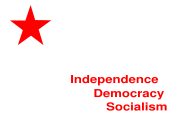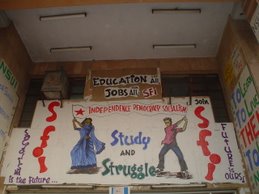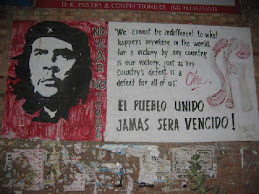STUDENTS’ FEDERATION OF INDIA
ALL INDIA STUDENTS’ FEDERATION
July 21, 2007
On the Successful Struggle led by the JNU Students’ Union!!
Dear Friends,
The JNU Students’ Union, under the leadership of the SFI-AISF, recently led a successful struggle against the rustication of 8 student activists, fines on three office bearers of the JNUSU and the students’ charter of demands including issues like increase in Merit-Cum-Means scholarships etc. The agitation was a prolonged and difficult one, especially because it was fought during the summer vacations when most of the students were not present in the campus. The JNUSU carried this struggle for 18 days including 12 days of indefinite hunger strike by the JNUSU President Dhananjay along with the JNUSU Vice-President and 4 other students. The JNU administration, which had tried to browbeat the student movement by victimizing student activists, had to finally relent and accept the demands of the JNUSU.
Adventurism of the Ultra-Left on 19th February
The present tenure of the JNUSU, the leadership of which is divided between SFI-AISF and the ultra-Left AISA, has seen two starkly different approaches towards the student movement. In the month of November, last year, the JNUSU along with some concerned student activists had raised the issue of violation of minimum wages for contract workers at various construction sites in JNU. A memorandum was submitted to this effect to the administration, which came out with only a halfhearted response and refused to take the matter seriously. A movement was gradually building up when things took an ugly turn because of an adventurist act by the ultra-Left.
On 19th February 2007, a demonstration called by the JNUSU was converted into a sudden gherao of the Registrar inside his car. On the Registrar’s instruction, posters demanding minimum wages for workers had been torn off from the administration block the same morning. The car of the Registrar was tied up with a rope while he was inside it, black paint smeared on it, posters pasted on the car and its tyres deflated. One student even climbed above the car and shouted slogans. Ultra-Left activists from the AISA (ML-Liberation) and the DSU (Maoists) took the lead in the gherao. The JNUSU office-bearers and other activists of the SFI-AISF, who did not participate in this action, couldn’t however prevent it from happening. Following the gherao, teachers from different departments came to appeal to the students to release the Registrar. They talked to the JNU administration and assured dialogue with students on the minimum wage issue. However, in characteristic ultra-Left style, they were called dalals of the administration and humiliated. It was indeed very unfortunate that teachers, who have always been the democratic ally of the JNU students in struggles against anti-student moves by the administration, were treated with such contempt. Ultimately, the gherao was lifted after 6 hours. This incident marked a new low in the politics of JNU.
However, rather than realizing the extent of adventurism that they had indulged in, a hunger strike was started on the same night and a flash strike called the next morning demanding an ‘apology’ from the JNU Administration for tearing off posters. The flash strike saw another round of ugly episodes with the teaching community. Pamphlets celebrating the gherao and calling the teaching community ‘arrogant’ were distributed in the campus. Things were moving in a dangerous direction. The JNU Teacher’s Association came out with an urgent appeal to the administration as well as the students not to precipitate matters. The JNUSU office-bearers and councillors from SFI-AISF demanded an immediate Council Meeting of the JNUSU to consider the appeal issued by the JNUTA. With the General Secretary of the JNUSU from the AISA squarely refusing to call a meeting of the JNUSU Council, the SFI-AISF decided to dissociate from the ongoing agitation. This dissociation was blithely labelled by the ultra-Left as ‘betrayal’ of workers’ rights.
The JNU administration wasted no time in cracking down on the students. Suspension orders were served to 10 students including the JNUSU President and Joint Secretary from the SFI-AISF. Some karamcharis who had participated in the agitation were also suspended. Crass adventurism displayed by the ultra-Left on 19th February in JNU created a tense atmosphere in the campus. It was in this backdrop that the SFI-AISF took the lead in salvaging the situation. At the behest of the SFI-AISF, a formal Council Meeting of the JNUSU held on 23rd February resolved to express regret for the 19th February incident (AISA representatives abstained on the resolution). This was followed by a massive Joint Public Meeting of the JNUSU, JNUTA, JNU Karmachari Association and JNU Officers’ Association to reaffirm the democratic traditions of JNU and demanded the withdrawal of the suspension orders served against the students and karamcharis. The meeting was addressed by several senior faculty members including Profs. Prabhat Patnaik, Jayati Ghosh, CP Chandrashekhar, Kamal Mitra Chenoy, Anuradha Chenoy, Purushottam Agarwal, Arun Kumar, Vivek Kumar, Ranjini Majumdar, Vikas Rawal, K.J.Mukherjee and Chamanlal (who is the JNUTA President). All the faculty members criticized the gherao of the Registrar and urged upon the JNUSU and the students not to precipitate matters. While upholding the legitimacy of the struggle for ensuring minimum wages for workers, the faculty members said that struggles in JNU have to be conducted in keeping with the democratic ethos of the university. Prof. Prabhat Patnaik said that JNU is a premier institution of higher learning in the country which is leading the intellectual battle against neoliberalism and imperialism. Nothing should be done to vitiate the impeccable academic environment in the campus and weaken the institution.
Correcting the Aberration
The JNUSU office-bearers from the SFI-AISF argued that the incident of 19th February was an
unfortunate aberration in the student movement. Numerous movements have been conducted in JNU under the SFI-AISF led JNUSU in the past where democratic forms of protest have, without an exception, led to fulfilment of the demands being raised. Significant struggles were waged over the past few years through democratic means; for building more hostels, constituting the GSCASH, rejection of the X Plan Proposals, enhancing the MCM scholarship etc; all of which were successful in mobilizing large sections of students and other sections of the university community and finally compelling the administration to concede the legitimate demands of the students. Indulging in adventurist acts in the name of protest has never been the tradition of the JNU student movement. Such acts indulged in by handful of students discredit the student movement, undermine its legitimacy, isolate the JNUSU from other sections of the university community and strengthen the hands of the administration. The worst
form of such reckless adventurism was seen in 1983, which led to the eventual sine die closure of the university, for which the JNU student movement had to pay a heavy price.
It was precisely for this reason that the SFI-AISF decided to take the initiative to make a course correction and bring the student movement back on track. The JNU administration initially constituted a three-member committee of Professors to deal with the entire matter. Out of the 10 students who were suspended, 6 expressed regret over the 19th February incident through individual letters, reiterating the JNUSU Council resolution. Based on this, their suspensions were withdrawn on 7th March. The DSU initially defied the JNUSU Council Resolution and took a position that they would not express regret over the incident. A University General Body Meeting (which is the highest decision making body of students as per the JNUSU Constitution) held on 8th March endorsed the JNUSU resolution expressing regret and rejected the DSU position of not expressing regret for the 19th February incident. After the UGBM, the DSU made a volte-face and submitted letters of regret to the administration on 13th March. This opportunistic posturing of the DSU did not go down well within the student community. However, the JNUSU office-bearers from SFI-AISF took the position that no disciplinary action should be taken by the administration after the students have expressed regret. The suspensions of the remaining 4 students were withdrawn on 16th March 2007. The SFI-AISF also took a position that in view of the regret expressed collectively by the JNUSU Council, the UGBM as well as the individual students who were suspended, there was no case for a separate Proctorial enquiry into the matter.
Administration’s high-handedness Meets Resistance
Though the suspension orders were revoked, the JNU administration had not abandoned its intention of coming down heavily on the student movement using the 19th February incident as a pretext. Despite the regret expressed by the JNUSU Council, the UGBM and individually by the students concerned, the administration rusticated 8 students and imposed a fine of Rs. 2000 each on three JNUSU office bearers. This order was served on 22nd June during the summer vacations as part of a well thought out plan by the administration. The ABVP and the Youth For Equality, true to their reactionary and anti-student character, came out in open support of the administration’s action and even went to the extent of demanding harsher punishment for the JNUSU office-bearers. In this backdrop, the JNUSU under the leadership of the SFI-AISF, launched an immediate agitation against the high-handedness of the administration arguing that after the expressions of regret both collectively and individually by students, such harsh punishments were totally unacceptable.
A relay hunger strike was started on 23rd June demanding revocation of punishments as well as the fulfilment of the long pending students’ charter of demands, including workers’ rights. The understanding behind combining these two issues was that the administration had come out with these punishments precisely to scuttle the positive agenda of the JNUSU. The Charter of demands included increasing the amount of MCM scholarship for B.A/M.A./M.Sc/M.C.A students from Rs. 1000 to Rs. 1500, to ensure that the scholarships announced by the UGC for research scholars be given with retrospective effect from July 2005, to bring gender violence under the purview of the GSCASH, to democratise the Equal Opportunity Office, to accept aleemeyat/fazeelat certificates for admissions to B.A 1st year, to build a mechanism to ensure minimum wages for workers and some other demands. After 6 days of relay hunger strike, the administration far from relenting went ahead and implemented the punishments by double-locking the rooms of the rusticated students. The JNUSU decided to intensify the agitation in response and an indefinite hunger strike was started from the night of 30th June led by the President of the JNUSU.
The JNU administration initially adopted a tough posture and the VC held a press conference to justify the punishments on the basis of the 19th February incident, conveniently avoiding any mention of the regret expressed by the JNUSU, the UGBM and the individual students. This created widespread discontent against the administration within the university community. The administration had clearly underestimated the strength of the JNU student movement and the goodwill and support it enjoys both within and outside the campus. The agitation gathered momentum, when a host of former JNUSU office-bearers, including former JNUSU President Sitaram Yechury came to JNU and addressed a massive public meeting in solidarity with the agitation on 7th July. Other former JNUSU office bearers who addressed that meeting were D. P. Tripathi, Prof. Anand Kumar, Prof. Ajay Patnaik, Amit Sengupta, Kavita Krishnan and Albeena Shakil. All the speakers drew instances from their own experiences as office-bearers of the JNUSU and upheld the legitimacy of the present agitation. They argued that the strength and maturity of the student movement of JNU was that it could correct itself on its own if any mistakes were committed in the course of a struggle, without any ‘external’ correctives like disciplinary actions by the administration. In a move that enthused the student community of JNU, Sitaram Yechury while commending the JNUSU for having expressed regret on the unfortunate incident of 19th February, gave a 48-hour ultimatum to the administration to open dialogue with the JNUSU; otherwise he said that the matter will no longer remain within the confines of JNU and would become a national issue. He also said that while at times an eagle may fly lower than a hen; a hen could never attain the towering heights, which an eagle can. “The JNUSU is the eagle and the administration is the hen”, said Com. Yechury amidst thunderous applause. Within 48 hours the JNU administration opened dialogue with the JNUSU.
Struggle Culminates Successfully
On the 12th day of the indefinite hunger strike after three days of prolonged dialogue, the administration was compelled to agree to the just demands of the JNUSU. In the agreement signed with the JNUSU, the administration has agreed that all the rusticated students would be given registration by 14th August (last day of registration for monsoon semester) on the basis of an appeal expressing regret. This agitation also succeeded in making substantial gains vis-à-vis the students’ charter of demands. The JNU administration has agreed in principle to start the M.Phil/PhD scholarship with effect from July 2005 and would pursue the matter with the UGC. The MCM scholarship for B.A/M.A./MCA/M.SC students has been increased to Rs.1500 per month from Rs.1000 per month and the family income cap for eligibility for MCM scholarship has been raised from Rs.75000 per annum to Rs. 1 lakh per annum. The issue of inclusion of gender violence in the purview of the GSCASH in the light of the Domestic Violence Bill has been sent for discussions at the School level. The administration has also agreed to set up a permanent body comprising students, teachers and karamcharis to monitor and ensure minimum wages for all casual workers. The recommendations of the equivalence committee for recognition of madarsa certificates in JNU will be pursued with the HRD Ministry by the administration. The process of democratising the Equal Opportunity Office will also be expedited. All these achievements were registered despite a nefarious attempt by the NSUI to
sabotage the agreement between the JNUSU and the administration at the last moment through backdoor manipulations.
As far as the fines imposed upon the JNUSU office-bearers are concerned, the SFI-AISF has taken the position that they should be revoked unconditionally. The ultra-Left, including the General Secretary of the JNUSU from AISA, insisted that the JNUSU office-bearers should also express regret once again in writing. The SFI-AISF has rejected this position on the basis of three arguments: (i) The JNUSU office-bearers have already communicated to the administration in writing the JNUSU Council resolution expressing regret on the 19th February incident. The UGBM, which is the highest decision making body of the students, have also collectively expressed regret. There is no reason why the JNUSU office-bearers should express regret individually once again. (ii) The fines imposed upon the JNUSU office-bearers are on the grounds that they were ‘unable to control the situation’ while those who were rusticated have been held responsible for specific acts like deflating the tyre of the Registrar’s car, tainting the car with black paint, using abusive language and instigating students for the act. It is clear that the JNUSU office-bearers were not personally involved in any of the adventurist acts on 19th February in any way — they have been fined only because they are JNUSU office-bearers. (iii) The AISA and the DSU had initially celebrated the 19th February gherao as an act of heroism and it was only after the initiative taken by the JNUSU office-bearers from the SFI-AISF and the appeal issued by the JNUTA that they realized their folly. AISA abstained from voting in the JNUSU Council on the resolution expressing regret. While they subsequently changed their position in the UGBM and stood by the Council resolution, the DSU opposed the Council resolution terming it a sell-out to the administration and refused to express any regret. It was only after their line was rejected by the UGBM that they made a volte-face and submitted letters of regret, that too for ‘inconvenience caused, if any’. In contrast, the SFI-AISF has taken a principled position right from the beginning that the 19th February incident was an aberration, argued for expressing regret for the same and held that any disciplinary action following the expression of regret would be unacceptable and fought tooth and nail. After having walked the talk, there is absolutely no question of the JNUSU office-bearers expressing regret once again. In fact SFI-AISF is also opposed to the General Secretary of the JNUSU from AISA submitting a regret letter, which for some strange reason he himself wants to do. The JNUSU officebearers, being elected representatives of the student community, have to defend the sanctity of their office against efforts by the administration to browbeat them.
Sd/-
Rajiv Kumar Ranjan, Secretary, SFI-JNU.
Sanjay Kumar, Secretary, AISF-JNU.



